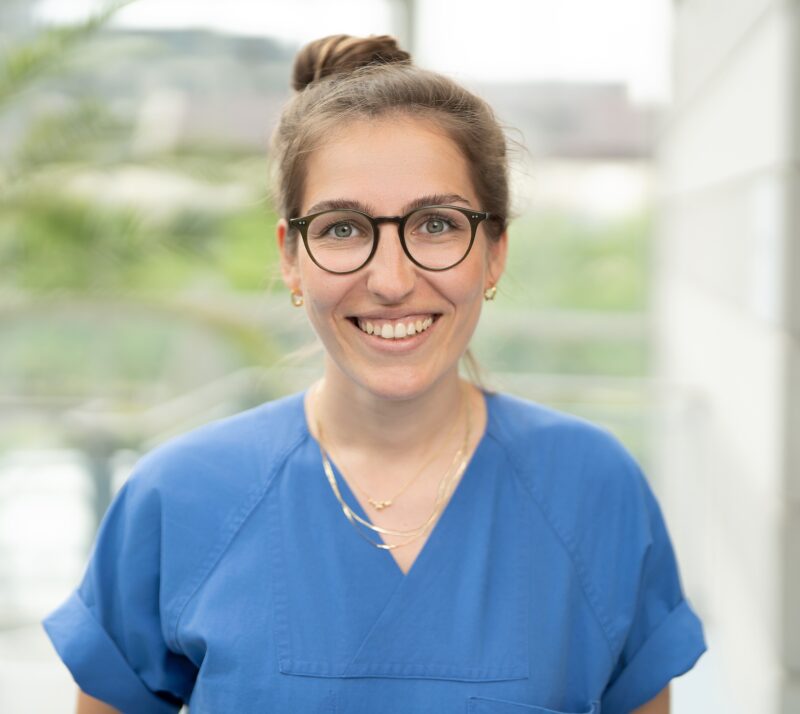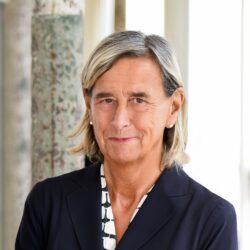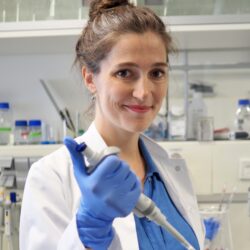Rare diseases affect children and adolescents in eight out of ten cases. Their participation in medical progress therefore depends crucially on dedicated pediatricians who are committed to the balancing act between bedside and laboratory. The Alliance4Rare research network initiated by the Eva Luise and Horst Köhler Foundation provides structured Clinician and Medical Scientist Programs (CS4RARE) to prepare researching paediatricians for this challenging task and to give them the necessary freedom for scientific work at a high level. The programs grant participants protected research periods in which they are released from clinical duties to advance scientific projects on rare diseases.
Dr. Urbantat, you have been chosen for the Alliance4Rare Junior Clinician Scientist Program, funded by the Eva Luise and Horst Köhler Foundation and the Berliner Sparkassenstiftung Medizin. What was your motivation to pursue this particular path in science and the clinic?
I was already fascinated by the interaction between translational research and clinical work during my medical studies. It was therefore clear to me that I wanted to combine these two exciting areas professionally. In everyday clinical practice, I also quickly realized how many questions were still unanswered regarding the pathomechanisms, diagnostics, treatment and disease progression of rare diseases. On the one hand, this made me curious and on the other, it spurred me on to get to the bottom of some of these questions. They can often only be answered through interdisciplinary collaboration between basic scientists and doctors. That also motivates me in my position as a clinician scientist to build the bridge from the laboratory to the clinic and vice versa, because: Only by working together can we improve medical care for people with rare diseases.
What are you currently working on and what would you like to achieve in the field of rare diseases?
I am currently working at the Charité – Universitätsmedizin Berlin in the Department of Pediatrics with a focus on pneumology, immunology and intensive care medicine and am training to become a pediatrician. I deal with primary ciliary dyskinesia (PCD). This is a genetic, chronic progressive muco-obstructive lung disease in which the cilia in the upper and lower airways (and often in other organs as well) do not function properly. About one in 7500 people have PCD. Patients struggle daily with a wet cough and often also chronic rhinitis and hearing problems.
More than 50 genes are now known to cause PCD, making it a very heterogeneous group. The disease-causing mechanisms are not yet well understood. In the special consultation for PCD, which is part of the Berlin Center for Rare Diseases (BCSE), we diagnose, treat and advise these patients. There is currently no causal therapy for people with PCD. The aim of my research project is to first understand the complex disease mechanisms of PCD and the influence of the different genes and then to derive possible new therapeutic approaches from this. To do this, I use the patient’s own cilia cultures (nasal epithelial cell cultures), which we can use to imitate an “avatar” of the airways in the laboratory. Over the last two years, I have established various methods to investigate the function of the cilia using these “avatars” and have also built up a biobank of ciliated epithelial cells from people with PCD. This allows potential new therapeutic approaches to be investigated individually in the laboratory in the future in the sense of personalized medicine.
What opportunities does Alliance4Rare funding open up for you in your day-to-day work that you wouldn’t have otherwise?
On the one hand, Alliance4Rare funding enables me to keep one foot in the clinic and the other in the lab and thus to advance my research project – firmly integrated and interlinked with my training as a pediatrician. And in addition, the funding offers networking and an exchange with other researchers in the Alliance4Rare.
Ruth Maria Urbantat studied human medicine at the Charité – Universitätsmedizin Berlin and the Medical University of Vienna. During her studies, she worked in the research group of Prof. Dr. Peter Vajkoczy, where she developed a 3D cell culture model to study the formation of new vessels in glioblastoma, a malignant brain tumor, as part of her doctorate. In 2018, she spent time abroad at the University of Toronto (Canada), where she took part in the Keenan Research Summer School. Since June 2021, Ruth Maria Urbantat has been undergoing further training as a pediatrician at the Department of Pediatrics with a focus on pneumology, immunology and intensive care medicine at Charité. She is part of Prof. Dr. Marcus A. Mall’s working group and cares for children and adolescents with primary ciliary dyskinesia (PCD).
Foto: Christian Lietzmann (CHL PhotoDesign)



